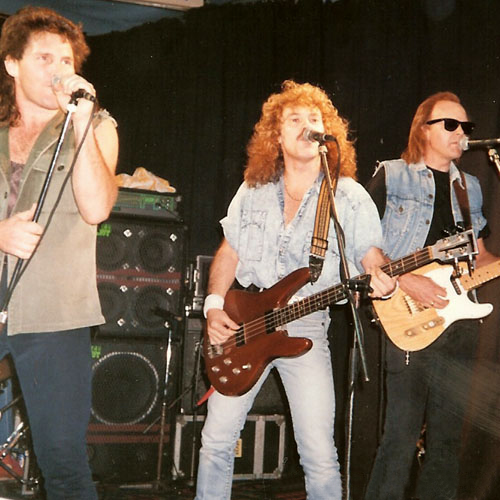|
12 Gold Bars
''12 Gold Bars'' is a 1980 compilation album by English rockers Status Quo. It achieved number 3 in the UK charts and remained in the charts for 48 weeks. This was longer than any other Quo album. All the songs featured on the album were hit singles during the period 1972–1979. It was followed up by '' 12 Gold Bars Vol. 2'' in 1984. Track listing *Note: on the UK cassette version of the album, sides one and two were reversed. *Note: the Australian & New Zealand version alternated "Paper Plane" and "Rain" with each other Side one # "Rockin' All Over the World" (John Fogerty) – 3:34 # "Down Down" (Francis Rossi/ Bob Young) – 3:50 # " Caroline" (Rossi/Young) – 3:44 # "Paper Plane" (Rossi/Young) – 2:56 # " Break the Rules" (Rossi/Young/Rick Parfitt/Alan Lancaster/ John Coghlan) – 3:40 # " Again and Again" (Parfitt/Andy Bown/Jackie Lynton) – 3:42 Side two # " Mystery Song" (Parfitt/Young) – 3:59 # "Roll Over Lay Down" (Rossi/Young/Lancaster/Parfitt/Coghlan) – 5: ... [...More Info...] [...Related Items...] OR: [Wikipedia] [Google] [Baidu] |
Status Quo (band)
Status Quo are a British rock band that formed in 1962. The group originated in London as The Scorpions and was founded by Francis Rossi and Alan Lancaster while they were still schoolboys. After a number of lineup changes, which included the introduction of Rick Parfitt in 1967, the band became The Status Quo in 1967 and Status Quo in 1969. As of 2022, the group have been active for 60 consecutive years (despite announcing a breakup in 1984, they would play Live Aid the following year and resume normal activities in 1986). They have had over 60 chart hits in the UK - more than any other rock band - including "Pictures of Matchstick Men", "Down Down", "Rockin' All Over the World", " Whatever You Want", " In the Army Now", and "What You're Proposing". Twenty-two of these reached the Top 10 in the UK Singles Chart, and fifty-seven reached the Top 40. They have released over 100 singles and 33 albums, most of which were bestsellers. Since reaching number 5 on the UK albums chart i ... [...More Info...] [...Related Items...] OR: [Wikipedia] [Google] [Baidu] |
Alan Lancaster
Alan Charles Lancaster (7 February 1949 – 26 September 2021) was an English musician, best known as a founding member and bassist of the rock band Status Quo, playing with the band from 1967 to 1985, with brief reunions in 2013 and 2014. As well as contributing to songwriter, songwriting, he was also one of the lead vocalists on albums and live concerts, taking the lead on tracks such as "Backwater", "Is There a Better Way", "Bye Bye Johnny", "High Flyer" and "Roadhouse Blues". Alan Lancaster formed the group in 1962 with his then schoolmate Francis Rossi. His final performance as a full-time member of Status Quo was at Wembley Stadium on 13 July 1985 for the opening of Live Aid. In March 2013, he collaborated with his old bandmates for a series of "Frantic Four" concerts in the UK. Career Early career While attending Sedgehill School, Sedgehill Comprehensive School in 1962, Lancaster befriended future Status Quo singer and guitarist Francis Rossi while playing in the schoo ... [...More Info...] [...Related Items...] OR: [Wikipedia] [Google] [Baidu] |
Productores De Música De España
Productores de Música de España (English: Spanish Music Producers, shortened as Promusicae) is the national organisation responsible for the music charts of Spain. It is a trade association that represents more than 90% of the Spanish recorded music industry. It is the International Federation of the Phonographic Industry (IFPI) group for Spain. Promusicae is based in Madrid, Spain at Calle María de Molina, 39. History Promusicae began in 1958 as a representative of the IFPI in Spain under the name of the Spanish Group of the International Federation of the Phonographic Industry (), although not officially an association, since Spanish law during the Franco regime did not recognize the right of association until 1977. In 1978, it was registered as an association under the name Spanish Phonographic Association () (AFE). In 1982, with the emergence and popularization of the music video, the AFE changed its name to Phonographic and Videographic Association of Spain () (AFYVE). F ... [...More Info...] [...Related Items...] OR: [Wikipedia] [Google] [Baidu] |
Kent Music Report
The Kent Music Report was a weekly record chart of Australian music singles and albums which was compiled by music enthusiast David Kent from May 1974 through to January 1999. The chart was re-branded the Australian Music Report (AMR) in July 1987. From June 1988, the Australian Recording Industry Association, which had been using the top 50 portion of the report under licence since mid-1983, chose to produce their own listing as the ARIA Charts. Before the Kent Report, ''Go-Set'' magazine published weekly Top-40 Singles from 1966, and Album charts from 1970 until the magazine's demise in August 1974. David Kent later published Australian charts from 1940 to 1973 in a retrospective fashion, using state by state chart data obtained from various Australian radio stations. Background Kent had spent a number of years previously working in the music industry at both EMI and Phonogram records and had developed the report initially as a hobby. The Kent Music Report was first release ... [...More Info...] [...Related Items...] OR: [Wikipedia] [Google] [Baidu] |
Living On An Island
"Living on an Island" is a single released by the British rock band Status Quo in 1979. It was included on the album '' Whatever You Want'' and featured Rick Parfitt on lead vocals. Lyrically, the song is about band member Rick Parfitt having to take a "tax year" outside of the United Kingdom and the boredom and isolation he felt living on the Isle of Jersey; however he is also excited about a pending visit from a friend ("Cruxie") who is arriving shortly. -The first verse deals with fame and the public's perception v. the reality and the resulting depression, due to loneliness. -The second verse is more optimistic, with Parfitt, not sounding depressed, but bored. -The third verse however, is positive; talking about the fun the two men are currently having. Although the storyteller indicates that he knows that this will be short lived, as his friend won't stay long. The themes of the song are isolation, friendship, partying and drugs, specifically cocaine. Every verse ends ... [...More Info...] [...Related Items...] OR: [Wikipedia] [Google] [Baidu] |
Whatever You Want (Status Quo Song)
"Whatever You Want" is a rock song by the British rock band Status Quo. Written by Rick Parfitt and Andy Bown, it was released on the album of the same name in 1979 and has become one of the band's better-known works. The track peaked at number 4 on the UK charts on 30 September 1979. It originally appeared on the band's 1979 album '' Whatever You Want'' and was later re-recorded for their 2003 album ''Riffs''. Composition The song commences with a quiet introduction, containing a guitar playing notes from chords. Rick Parfitt and Francis Rossi used chorus, fuzz and flanging effects on their guitars. This lasts for approximately 26 seconds, and fades out towards the end. After this, the guitar picks up once more with a D-minor riff, and 40 seconds into the piece, the familiar D-major riff of the song begins, accompanied by drums from the 56 second mark. At 1 minute, 11 seconds, all audio pauses for approximately half a second; at this point, the lyrical portion commences. The mus ... [...More Info...] [...Related Items...] OR: [Wikipedia] [Google] [Baidu] |
Wild Side Of Life
"The Wild Side of Life" is a song made famous by country music singer Hank Thompson. Originally released in 1952, the song became one of the most popular recordings in the genre's history, spending 15 weeks at number one on the ''Billboard'' country chart,Whitburn, Joel, "Top Country Songs: 1944-2005," 2006. solidified Thompson's status as a country music superstar and inspired the answer song, "It Wasn't God Who Made Honky Tonk Angels" by Kitty Wells.Malone, Bill, "Classic Country Music: A Smithsonian Collection" ((booklet included with '' Classic Country Music: A Smithsonian Collection'' 4-disc set). Smithsonian Institution, 1990). Song history "The Wild Side of Life" carries one of the most distinctive melodies of early country music, used in "Thrills That I Can't Forget" recorded by Welby Toomey and Edgar Boaz in 1925, "I'm Thinking Tonight of My Blue Eyes" by the Carter Family in 1929, and "Great Speckled Bird" by Roy Acuff in 1936. By 1951, it was in the public domain, and ... [...More Info...] [...Related Items...] OR: [Wikipedia] [Google] [Baidu] |


